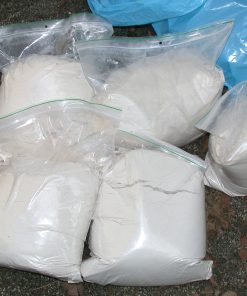Amphetamine
Amphetamine
Amphetamine, A synthetic substance. Normally seen as a white powder, it acts as a stimulant of the central nervous system (CNS). It is believed that amphetamine was first manufactured in the 1880s by the German chemist Leuckart, although evidence for this is lacking. It appears that, as in the case of methamphetamine, systematic studies of its chemistry did not come about until the early twentieth century. Furthermore, Amphetamine has some limited therapeutic use, but most is manufactured in clandestine laboratories in Europe. Moreover, It is under international control and closely related to methamphetamine.
Chemistry
Amphetamine (CAS-300-62-9) is a member of the phenethylamine family, which includes a range of substances that may be stimulants, entactogens or hallucinogens. Thus, amphetamine is N,α-methylphenethylamine.
According to IUPAC, the fully systematic name is N,α-methylbenzeneethanamine. The asymmetric α-carbon atom gives rise to two enantiomers. And, These two forms were previously called the [–]- or l-stereoisomer and the [+]- or d-stereoisomer, but in modern usage are defined as the R- and S-stereoisomers.
Molecular structure

Molecular formula: C9H13N
Molecular weight: 135.2
Physical form
Amphetamine base is a colourless volatile oil insoluble in water. The most common salt is the sulfate (CAS-60-13-9): a white or off-white powder soluble in water. Illicit products mostly consist of powders. Tablets containing amphetamine may carry logos similar to those seen on MDMA and other ecstasy tablets.
Pharmacology
Amphetamine is a CNS stimulant that causes hypertension and tachycardia with feelings of increased confidence, sociability and energy. In addition to, It suppresses appetite and fatigue and leads to insomnia. Following oral use, the effects usually start within 30 minutes and last for many hours. Later, users may feel irritable, restless, anxious, depressed and lethargic. Also, It increases the activity of the noradrenaline and dopamine neurotransmitter systems. Amphetamine is less potent than methamphetamine, but in uncontrolled situations the effects are almost indistinguishable. However, The S-isomer has greater activity than the R-isomer.
Look no further than Pain Chemist to Buy Amphetamine Online.
It is rapidly absorbed after oral administration. After a single oral dose of 10 mg, maximum plasma levels are around 0.02 mg/L. The plasma half-life varies from 4 to 12 hours and is dependent on the urinary pH: alkaline urine decreases the rate of elimination. A major metabolite is 1-phenyl-2-propanone, with smaller amounts of 4-hydroxyamphetamine. Analysis of amphetamine in urine is confounded because it is a metabolite of methamphetamine and certain medicinal products. Acute intoxication causes serious cardiovascular disturbances as well as behavioral problems that include agitation, confusion, paranoia, impulsivity and violence.
Buy Amphetamine Online
Chronic use of amphetamine causes neurochemical and neuroanatomical changes. Dependence — as shown by increased tolerance — results in deficits in memory and in decision-making and verbal reasoning. Some of the symptoms resemble those of paranoid schizophrenia. These effects may outlast drug use, although often they resolve eventually. Injection of amphetamine carries the same viral infection hazards (e.g. HIV and hepatitis) as are found with other injectable drugs such as heroin. Fatalities directly attributed to amphetamine are rare. The estimated minimum lethal dose in non-addicted adults is 200 mg.
Synthesis and precursors
The most common route of synthesis is by the Leuckart method.This uses (P2P, BMK, phenylacetone) and reagents such as formic acid, ammonium formate or formamide to yield a racemic mixture of the R- and S-enantiomers. A much less common, but stereoselective, method is by reduction of the appropriate diastereoisomers of norephedrine or norpseudoephedrine. In addition to, These precursors (1-phenyl-2-propanone, norephedrine and norpseudoephedrine) are listed in Table I of the United Nations 1988 Convention Against Illicit Traffic in Narcotic Drugs and Psychotropic Substances. Furthermore, The corresponding EU legislation is set out in Council Regulation (EEC) No 3677/90 (as later amended), which governs trade between the EU and third countries.
Mode of use
Amphetamine may be ingested, snorted and, less commonly, injected. Unlike the hydrochloride salt of methamphetamine, amphetamine sulfate is insufficiently volatile to be smoked. When ingested, a dose may vary from several tens to several hundreds of milligrams depending on the purity.
Showing the single result
-
Pain Pills
Where To Buy Amphetamine Online
$170.0 – $3,750.0 Select options This product has multiple variants. The options may be chosen on the product page
